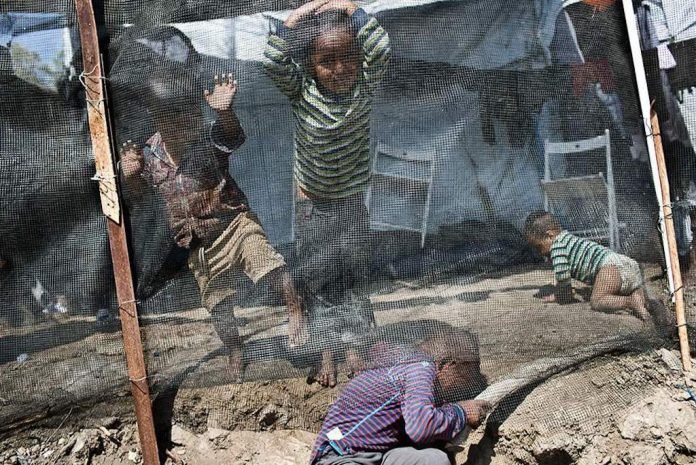A large arrival of migrants from Turkey has rung alarm bells at the asylum service on the Greek Aegean island of Lesvos, according to a report by Greek daily Kathimerini on Tuesday.
“The arrival on the island of 615 migrants in the past three days pushed the total number of asylum seekers on Lesvos to 11,053,” the daily reported, adding that 8,912 of them are staying in one asylum center.
“Of those people, 8,912 are staying at the already overcrowded center near the village of Moria, which was designed to hold a maximum of 3,100 people. Another 1,185 live at Kara Tepe and the rest at smaller camps,” said the Greek daily.
Turkey signed an agreement with the European Union to limit the number of refugees crossing the Aegean Sea to Europe through Greece, during a previous period of high migration in March 2016. Under the terms of that agreement, migrants who do not claim asylum in Greece are immediately returned to Turkey.
However, almost all migrants have put in applications for asylum, putting a severe strain on the already overcrowded migration centers on Lesvos and other islands. “If the migration flows continue at the current rate, we won’t be able to keep going and keep control of the situation,” Marios Kaleas, the head of the local asylum office, told Kathimerini.
The office has been particularly busy over the past week, processing 750 new asylum applications, following a large increase in arrivals from neighboring Turkey, according to the report.
“They all lodge asylum applications, otherwise they are immediately returned to Turkey,” told Kaleas to Kathimerini. He also noted that the majority attempt to be categorized in groups deemed as “vulnerable” as this guarantees their transfer to the Greek mainland, where reception facilities are less crowded.
The head of the Moria center, Yiannis Balbakakis, also told Kathimerini that overcrowding has created a ‘very difficult situation’ which has been aggravated due to the presence of people from many ethnic groups.” However, some of the reports on the conditions in the camps have been exaggerated, Balbakakis was quoted as saying.
In a statement, Doctors Without Borders, whose representatives are stationed close to the Moria center, called for the immediate transfer of all minors and members of vulnerable groups from the island facility to the mainland. “Every week, Doctors Without Borders teams see incidents involving adolescents who try to commit suicide or self-harm,” the statement said, adding that they also have to deal with “serious cases of violence.”
Meanwhile, Greece’s migration minister has pledged to improve living conditions for migrants in camps on islands in the Aegean Sea, where he said arrivals had doubled this summer. “We will make every effort to improve the living conditions on the East Aegean islands,” Migration Minister Dimitris Vitsas told Greek radio station 24/7 on Tuesday.
He said migrant arrivals had almost doubled this summer compared to last year on the islands of Lesbos, Kos, Samos, Chios, and Leros, which serve as gateways to Europe for migrants traveling from Turkish shores. “More than 70 percent of people” living in the Moria camp on Lesbos arrived this summer, he added.
Government data on Sept. 17 showed there were more than 11,000 refugees and migrants on Lesbos, including nearly 9,000 in Moria, almost triple the nominal capacity. Nineteen NGOs including Oxfam, Caritas and Terre des Hommes earlier this month called for “immediate and urgent action” from Athens to end the “shameful” situation in Moria.
“On Sunday [Sept. 16], 416 people arrived on the islands, including 324 on Lesbos,” Vitsas said and added that the European Union “has not done enough to deal with the influx of migrants in the eastern Mediterranean.”
A total of 3,189 Turkish nationals have arrived in Greece and applied for asylum in the last two years, according to Greek Immigration Ministry data. The figure, which surged after a controversial coup attempt in Turkey on July 15, 2016, was around 100 in the three-year period prior to the abortive putsch.
In July alone, 687 Turks applied for asylum in Greece, while more Turks were trying to reach Western Europe to lodge asylum applications.
The Turkish government started a crackdown after the coup attempt that led to the dismissal of nearly 140,000 civil servants and investigations into some 400,000 citizens on “terrorism” charges.
The government accuses the Gülen movement of orchestrating the failed putsch, although the movement strongly denies any involvement. In the last two years, 550 people have been detained and more than 7,000 passports have been confiscated by security at İstanbul Atatürk Airport over Gülen links.
















